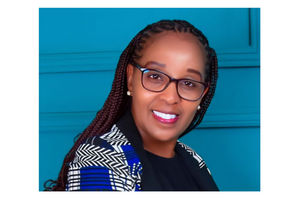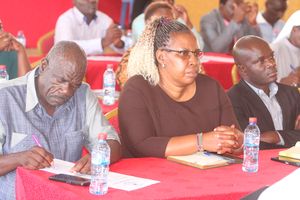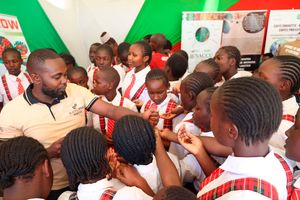
Silas Mwirigi, the principal of Kagumo High School, speaks on April 22, 2025 during the Kenya National Schools Principals Forum in Mombasa.
Principals of national schools have expressed concerns about the objectivity of the Kenya Junior School Education Assessment (KJSEA), which will be administered for the first time at the end of this year and used to place learners in senior schools.
The assessment will be used to place the more than 1.2 million learners in Grade 9 into senior schools in January next year. The learners are the first cohort of the Competency Based Curriculum (CBC) and will be placed in senior schools based on the career pathways they will pursue. As with the 8-4-4 that CBC replaced, there is expected to be cut-throat competition for places in national and extra-county schools.
As a result, principals now fear that some schools, or rogue teachers in junior schools, may misrepresent the performance of their learners to give them an advantage in gaining admission to schools known for good academic performance. The principals had gathered at a conference in Mombasa to discuss issues affecting their schools and the ongoing education reforms.
“We are concerned about the placement of the Grade 9 learners. We are concerned about integrity and how genuine these results will be,” said Dr Silas Mwirigi, the chief principal of Kagumu High School.

Teachers Service Commission CEO Nancy Macharia sits with Heads of Secondary Schools on April 22, 2025 during the Kenya National Schools Principals Forum in Mombasa.
The KJSEA is administered at the end of junior secondary school (grade 9) and consists of 20 percent from the Kenya Primary School Education Assessment (KPSEA) they took in grade 6, 20 percent from school-based assessments they took in grades 7 and 8, and 60 percent from the summative assessment in grade 9. The KPSEA also has a school-based component, which is administered and marked by teachers.
“Nobody in this country, even the primary schools where the JS is domiciled, will allow their learners to fail. Therefore, it will be tasking for us to manage these students in senior school,” said Dr Mwirigi.
The Senior School will have three pathways (Social Sciences, Arts and Sports, and Science, Technology, Engineering and Mathematics – STEM). Each pathway will offer a unique set of subjects and learning experiences aligned with specific career pathways.
However, only schools with the capacity and infrastructure will offer the three pathways, while others will offer two. All national schools will offer all pathways, as will most extra-county schools, as they have the infrastructure, capacity and staff. Students will be able to select the schools they wish to attend from May 20, 2025. In March, the Kenya National Examinations Council (Knec) registered candidates for the exams.
Commenting on a suggestion that national schools should have day wings, Dr Mwirigi said it would be a challenge to manage learners coming in and out of the school.
“Our concern is how to control the discipline and the influence from outside. At the same time, national schools are already overstretched,” he said.
Dr Mwirigi warned that mixing day students and boarders would be problematic and urged the state to expand national schools to accommodate more learners.
The KPSEA performance report is available on the KNEC portal so that parents can check the performance of their children in schools. School Based Assessment (SBA) results are entered into the portal by teachers for processing by Knec.

Education Cabinet Secretary Julius Ogamba (centre) meets principals on April 23, 2025 during the Kenya National Schools Principals Forum in Mombasa.
Students presented for KJSEA must be in the Grade 9 database, have a KPSEA performance report and have SBA scores for Grades 7 and 8 in all learning areas.
“Any requests for transfer at Grade 9 must be done online to avoid double registration of candidates. Transfer of candidates will not be allowed after the closure of the registration portal on March 28, 2025,” Knec says on its website.
The KPSEA, which is conducted in Grade 6 before students move on to junior secondary school, is not used to place candidates in junior secondary school but to monitor their learning progress.
At the same time, the principals called on the Ministry of Education to expedite the process of converting teachers to CBC. Last week, Teachers Service Commission CEO Nancy Macharia said the commission was doing all it could to ensure that all senior school administrators and other teaching staff were adequately retrained to be ready for the first cohort of Grade 10 pupils in 2026. Ms Macharia said the commission had so far retrained 229,292 primary school teachers, 75,000 in junior schools and 154,292 secondary school teachers.
The National Parents Association has called on the state to support it in training parents on CBC.
“Many parents are not informed on what CBC is. The association needs to be empowered to create awareness through schools,” said Silas Obuhatsa, the association’s chairperson.









